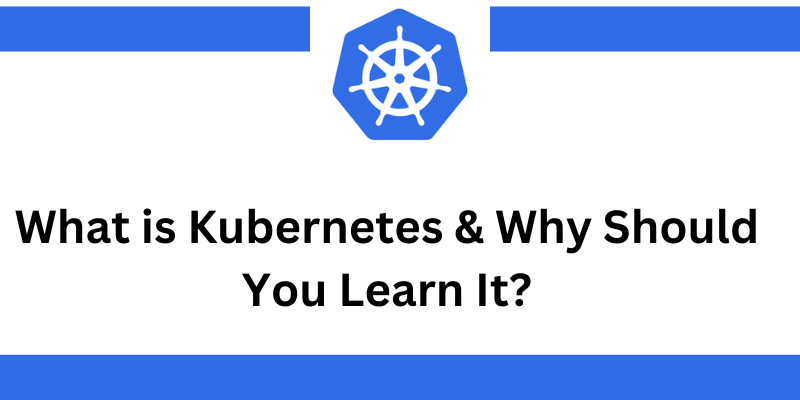
In the vast ocean of modern cloud computing there is a rising star that has steadily become indispensable for managing containers. Kubernetes acts like an orchestrator guiding a complex symphony as it coordinates & manages containers to ensure that applications run smoothly efficiently & reliably. If you are a student tech professional or decision maker in the IT space understanding Kubernetes is no longer optional. It is a must have skill. But what exactly is Kubernetes & why should you invest time in learning it? Let us dive in.
What is Kubernetes
An open source technology called Kubernetes sometimes shortened to K8s automates the deployment scaling & administration of containerized applications. It became the de facto standard for container orchestration after being created by Google & subsequently donated to the Cloud Native Computing Foundation.
Consider containers as self contained lightweight portable environments that bundle an application & all of its dependencies. Although Docker a popular tool is great at building & executing containers it is not very effective at managing them at scale. Here is where Kubernetes comes into play. It functions as a strong adaptable solution for scaling & managing containers across machine clusters.
Imagine running a fleet of ships each carrying a piece of your application. Kubernetes is like the harbor master that coordinates where each ship docks monitors the weather & reroutes them when necessary. All while ensuring no ship collides or is left behind. It is designed to keep everything running smoothly no matter the scale.
You can also read this: What is Kubernetes?
The Core Features of Kubernetes
To fully appreciate the value of Kubernetes it is essential to understand some of its key features & functionalities.
Automatic Scaling
Kubernetes can adjust the number of containers your application uses based on demand. Whether traffic increases or dips it ensures you are using resources efficiently & keeps costs down without sacrificing performance.
Self Healing
If a container fails Kubernetes detects the issue & restarts or replaces it automatically. This capability ensures your applications are highly available & resilient without requiring manual intervention.
Service Discovery & Load Balancing
Kubernetes can expose containers using DNS or their IP address. Plus it distributes traffic among containers so no single instance gets overwhelmed.
1. Rollouts & Rollbacks
Deploying updates to your application can be tricky but Kubernetes simplifies the process by enabling gradual rollouts. If something goes wrong during an update Kubernetes can rollback to a previous stable state minimizing downtime.
2. Storage Orchestration
Whether you are using local storage cloud storage or network storage Kubernetes seamlessly integrates with different systems & assigns storage resources as needed by your containers.
3. Declarative Configuration
Kubernetes operates on a declarative configuration model. You define the desired state of your application such as how many containers you want running & Kubernetes ensures this state is maintained.
Why You Should Learn Kubernetes
Kubernetes is more than just a buzzword. It has solidified its place in the infrastructure stack of major companies around the globe including tech giants like Google, AWS & Microsoft. If you are a student aspiring to enter the tech industry or a professional looking to sharpen your skills here is why taking Kubernetes training is a strategic investment.
1. It is the Future of Cloud Native Applications
Cloud native applications are built to leverage the full potential of the cloud. They are scalable resilient & agile. Kubernetes sits at the heart of this transformation. As businesses migrate more workloads to the cloud Kubernetes is becoming essential to modern software development & operations. Learning it now positions you for future growth.
2. Widely Adopted Across Industries
Kubernetes is used not only by tech companies but also across industries like finance healthcare & e–commerce. Its ability to manage complex distributed systems has made it a top choice for organizations looking to build deploy & scale applications efficiently. By learning Kubernetes you are aligning your skillset with a highly sought after industry standard.
3. Automates Manual Tasks
One major benefit of Kubernetes is automation. As applications grow more complex manually managing them becomes impractical. Kubernetes handles tasks like scaling monitoring & deploying so your team can focus on building features & driving innovation.
4. Bridges the Developer Operations Gap
Kubernetes embodies the principles of DevOps bringing development & operations teams closer together. By mastering Kubernetes you will help create a more collaborative environment where code can be rapidly deployed tested & scaled while maintaining system reliability.
5. Massive Ecosystem & Community
The Kubernetes ecosystem is vast & vibrant with numerous tools extensions & integrations. Whether you are looking to manage log security or monitoring Kubernetes offers a rich array of options. Plus since it is open source there is a thriving community of contributors constantly improving it. Learning Kubernetes connects you to this dynamic ecosystem of tools & professionals.
Conclusion – Why Kubernetes Should Be on Your Radar
Kubernetes is more than a passing fad. It is changing the way we develop & use applications. Kubernetes has become a vital tool for effectively managing containerized workloads & automating scalability in this rapidly changing technological environment. Because of its broad industry use & the continuous transition to cloud native programming it is an essential talent for anyone hoping to succeed in the tech industry.
Learning Kubernetes enables you to take advantage of automation scalability & resilience regardless of your level of experience as an engineer developer or decision maker assessing infrastructure expenditures. Kubernetes is revolutionizing software delivery much like the industrial revolution changed how we make things. Kubernetes is a crucial tool to have in your toolbox if you want to stay ahead in the software industry.